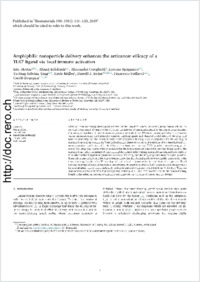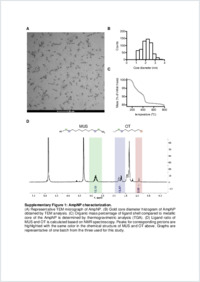Amphiphilic nanoparticle delivery enhances the anticancer efficacy of a TLR7 ligand via local immune activation
- Mottas, Inès Ecole de Pharmacie Genève-Lausanne, University of Lausanne, University of Geneva, Switzerland - Medicine Department, University of Fribourg, Switzerland
- Bekdemir, Ahmet Institute of Materials, EPFL, Lausanne, Switzerland
- Cereghetti, Alessandra Ecole de Pharmacie Genève-Lausanne, University of Lausanne, University of Geneva, Switzerland
- Spagnuolo, Lorenzo Ecole de Pharmacie Genève-Lausanne, University of Lausanne, University of Geneva, Switzerland - Medicine Department, University of Fribourg, Switzerland
- Yang, Yu-Sang Sabrina Dept. of Materials Science and Engineering, Massachusetts Institute of Technology, Cambridge, USA - Koch Institute for Integrative Cancer Research, Massachusetts Institute of Technology, Cambridge, USA
- Müller, Marie Institute of Materials, EPFL, Lausanne, Switzerland
- J.Irvine, Darrell Koch Institute for Integrative Cancer Research, Massachusetts Institute of Technology, Cambridge, USA - Dept. of Materials Science and Engineering, Massachusetts Institute of Technology, Cambridge, USA
- Stellaccic, Francesco Interfaculty Bioengineering Institute, EPFL, Lausanne, Switzerland
- Bourquin, Carole Ecole de Pharmacie Genève-Lausanne, University of Lausanne, University of Geneva, Switzerland - Medicine Department, University of Fribourg, Switzerland
-
01.01.2019
Published in:
- Biomaterials. - 2019, vol. 190–191, p. 111–120
English
Although immunotherapy shows great promise for the long-term control of cancer, many tumors still fail to respond to treatment. To improve the outcome, the delivery of immunostimulants to the lymph nodes draining the tumor, where the antitumor immune response is initiated, is key. Efforts to use nanoparticles as carriers for cancer immunotherapy have generally required targeting agents and chemical modification of the drug, and have unfortunately resulted in low delivery and therapeutic efficiency. Here, we report on the efficacy of gold nanoparticles with approximately 5 nm hydrodynamic diameter coated with a mixture of 1-octanethiol and 11- mercaptoundecanesulfonic acid for the delivery of an immunostimulatory TLR7 ligand to tumor-draining lymph nodes. The drug was loaded without modification through nonspecific adsorption into the ligand shell of the nanoparticles, taking advantage of their amphiphilic nature. After loading, nanoparticles retained their stability in solution without significant premature release of the drug, and the drug cargo was immunologically active. Upon subcutaneous injection into tumor-bearing mice, the drug-loaded particles were rapidly transported to the tumor-draining lymph nodes. There, they induced a local immune activation and fostered a cytotoxic T-cell response that was specific for the tumor. Importantly, the particle-delivered TLR7 ligand blocked the growth of large established tumors and significantly prolonged survival compared to the free form of the drug. Thus, we demonstrate for the first time that nanoparticle delivery of a TLR7 immunostimulant to the tumor-draining lymph nodes enhances antitumor immunity and improves the outcome of cancer immunotherapy.
- Faculty
- Faculté des sciences et de médecine
- Department
- Département de Médecine
- Language
-
- English
- Classification
- Biological sciences
- License
-
License undefined
- Identifiers
-
- RERO DOC 324118
- DOI 10.1016/j.biomaterials.2018.10.031
- Persistent URL
- https://folia.unifr.ch/unifr/documents/307624
Other files
Statistics
Document views: 110
File downloads:
- pdf: 226
- Supplementary material: 144

